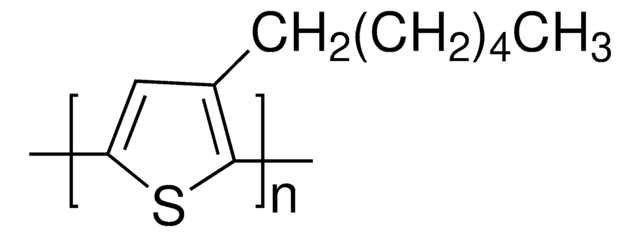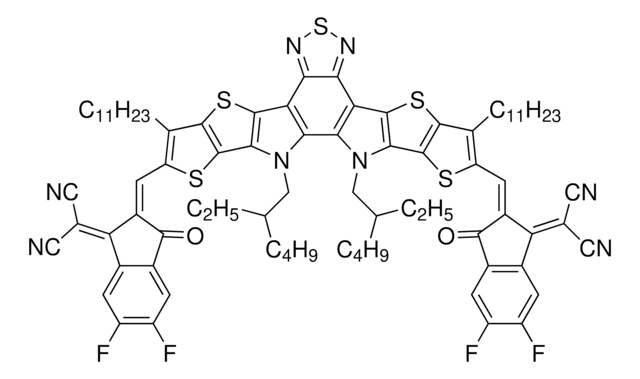906921
PQT-12
Synonym(s):
Poly(3,3′′′-didodecyl[2,2′:5′,2′′:5′′,2′′′-quaterthiophene]-5,5′′′-diyl), Poly(4,4′′-didodecyl[2,2′:5′,2′′:5′′,2′′′-quaterthiophene]-5,5′′′-diyl)
About This Item
Recommended Products
description
Band gap: 2.27 eV
Eox = 0.45 V
Solution processable (chloroform, chlorobenzene, etc)
LIFT transferable
form
solid
mol wt
Mw 10,000-25,000 by GPC
color
brown
solubility
>5 mg/mL (in CHCl3)
λmax
473 nm in toluene
Orbital energy
HOMO -5.24 eV
LUMO -2.97 eV
storage temp.
15-25°C
Related Categories
Application
Storage Class Code
11 - Combustible Solids
WGK
WGK 3
Flash Point(F)
Not applicable
Flash Point(C)
Not applicable
Certificates of Analysis (COA)
Search for Certificates of Analysis (COA) by entering the products Lot/Batch Number. Lot and Batch Numbers can be found on a product’s label following the words ‘Lot’ or ‘Batch’.
Already Own This Product?
Find documentation for the products that you have recently purchased in the Document Library.
Articles
Small molecular weight organic semiconductors are promising for flexible transistor applications in next-gen soft electronics.
Professors Tokito and Takeda share design principles and optimization protocols for organic electronic devices, focusing on flexibility and low cost.
Professor Chen (Nankai University, China) and his team explain the strategies behind their recent record-breaking organic solar cells, reaching a power conversion efficiency of 17.3%.
Our team of scientists has experience in all areas of research including Life Science, Material Science, Chemical Synthesis, Chromatography, Analytical and many others.
Contact Technical Service








